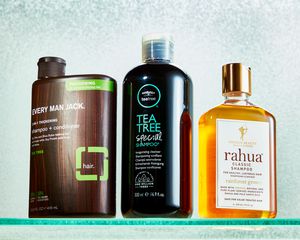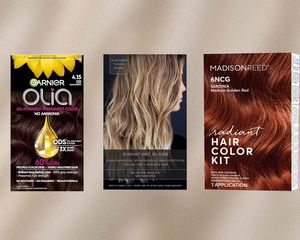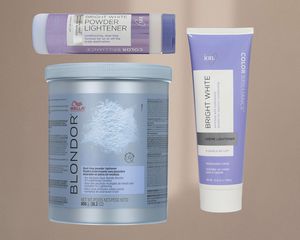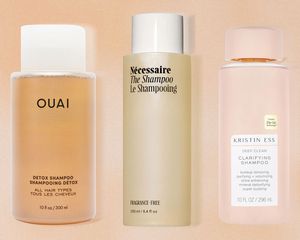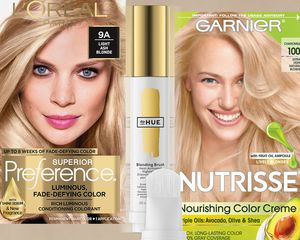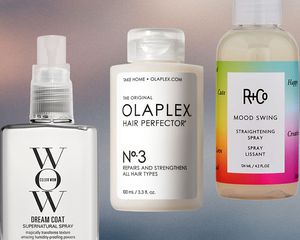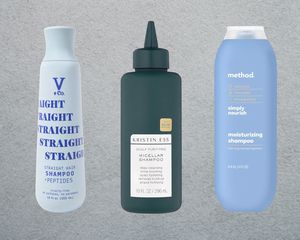:max_bytes(150000):strip_icc()/How-to-Strengthen-Your-Hair-with-Amino-Acids-d2d4a1f9d2f542a3b22e1a0c83188ff6.png)
Amino acid is one of those ingredients you’ve probably heard name-dropped about a kajillion times, but still don’t know exactly what it is—and that’s okay. We’re here to fill you in.
Amino acids are molecules that combine to form proteins. When proteins are broken down or digested, amino acids are what’s left behind. “Amino acids are the building blocks of proteins,” says board-certified dermatologist Tracy Evans. “They have identical molecular structures consisting of an alpha-carbon, carbonyl group, amino group, and an R-group (side chain).” We asked Evans and trichologist Anabel Kingsley to tell us all about the ways amino acids can boost your strands.
Meet the Expert
- Tracy Evans, MD, MPH, is a board-certified dermatologist and medical director of Pacific Skin and Cosmetic Dermatology.
- Anabel Kingsley is a consultant trichologist and brand president at Philip Kingsley.
Keep reading to find out all about the benefits of amino acids for hair.
Amino Acids for Hair
TYPE OF INGREDIENT: Protein
MAIN BENEFITS: Strengthens hair, fights frizz, and prevents breakage
WHO SHOULD USE IT: Anyone looking for stronger hair, to tame frizz, or to boost porous hair
HOW OFTEN CAN YOU USE IT: Daily in a formulated product
WORKS WELL WITH: Shampoos, conditioners, and leave-in treatments
DON’T USE WITH: Amino acids play well with other ingredients and have no known interactions.
What Are Amino Acids?
The main purpose of amino acids are to build proteins. “Our bodies need 20 different amino acids to maintain good health and normal bodily functions,” explains Evans. “We obtain these essential amino acids through the food we eat. Our bodies can also manufacture 11 amino acids that we do not have to obtain through our diets.”
Since your hair is made of protein, it's made of amino acids. “They're responsible for your hair strength and structure,” says Kingsley. “If you have a diet that's deficient in protein, and also in specific amino acids called essential amino acids, which are proteins your body can't make on its own, your hair can break more easily. It won’t grow to its best ability or have its best quality.”
Though amino acids are plentiful in hair products, it’s crucial to eat enough protein to boost your hair health. “The most important thing is to make sure that as your hair grows, you're giving it all of the tools that it needs to be as healthy as possible from a dietary standpoint,” Kingsley says. “I always put the biggest emphasis on what you're putting into your body.” She notes eggs (particularly egg whites) are the most well-rounded protein source since they contain all the essential amino acids. Oily fish, quinoa, nuts, lean meats, and low-fat cheese are also good sources of protein.
Benefits of Amino Acids for Hair
Since amino acids appear in a range of hair products, you can pick the ones that target your needs. Though every formulation is different, there are a few general perks that you can expect. “When amino acids are formulated into hair products, they can be really good at a range of things,” Kingsley says. “Depending on the amino acid used and the formulation as a whole, certain amino acids can add body, while others can be strengthening.”
- Provide protection: “Amino acids fill damaged gaps in the outer hair cuticle, which is its protective layer,” Kingsley says.
- Keratin boost: “Keratin, the protein that makes up as much as 95 percent of our hair shaft, is made of over 18 types of amino acids,” Evans says.
- Add hydration: “Some amino acids can be moisturizing because they can draw moisture into the hair and create a barrier over your hair to prevent moisture loss,” Kingsley says.
- Pump up the volume: “Amino acids are commonly in shampoos to add body and volume,” Kingsley says. “Things like small-chain plant proteins or cellulose can add nice body to the hair.”
- Stronger strands: “Amino acids can help to add strength to the hair shaft to allow the hair to hold on to more moisture,” Evans says. “The most well-known for providing strength for the hair are cysteine and methionine.”
- Bring shine: “There are newer ingredients like silk proteins that are being put into hair products and they can add nice shine,” Kingsley says.
- Thicker hair: Though the effect is just temporary, amino acids are often used in thickening protein sprays. “Certain proteins can coat the hair without weighing it down, just adding some texture to bulk up strands,” Kingsley says.
Hair Type Considerations
According to Evans plenty of hair types can get a boost from amino acids—particularly hair that is more porous, such as color-treated hair. Those with naturally curly or frizzy hair, or hair that tends to break easily, will also see results.
“It's really the formula as a whole because there are so many different amino acids,” Kingsley says. “The effectiveness of an amino acid on its own isn't going to completely transform your hair; it's also going to be about what else is in that formula.” For example, if you have coily hair that’s dry, fragile, and porous, Kingsley says a product with amino acids can be really beneficial, but you're also going to need oils such as olive, castor, or coconut oil to condition the hair,
How to Use Amino Acids for Hair
There are plenty of products formulated with amino acids on the market, so see what works best for your hair’s needs and follow the instructions. Be sure to examine the integrity of the amino acid that’s being used, advises Kingsley. Where is it sourced from? “You can have the same ingredient name, but some might be sourced cheaply or they're not as good of a quality,” she says. “It's also about the concentration of that ingredient in the formula. It's quite tricky to look for these ingredients in a mask or in shampoo... because there are so many things that can affect the effectiveness of a formula. I always tell people to look at reviews, ask friends, and purchase from a brand that you trust.”
“Our Body Building Shampoo contains wheat protein which is strengthening and also adds volume,” Kingsley says. Designed for fine hair, the shampoo has natural cellulose to cleanse while delivering volume, shine, and strength.
Thirsty locks will drink this hydrating shampoo right up. It’s also ideal for stressed, coarse, or curly hair. Recommended by Evans, the formula contains coconut oil to soften, hydrolyzed rice protein to strengthen, shea butter to nourish, and vitamin E for scalp health.
Work your curls while fighting frizz with this defining cream, which offers flexible hold. Designed to work for all curl types from wavy to coily, it taps rice amino acids to seal the cuticle and block frizz. Avocado oil gives hydration and boosts shine, while mollis leaf extract and tomato fruit ferment seal the cuticle to help curl formation.
The mild formula in this conditioner leaves locks shiny, hydrated, and manageable. Amino acids boost moisture, while coconut oil and jojoba oil help soften. The versatile conditioner works well for all hair types and textures.
This purifying and clarifying shampoo leaves hair squeaky clean while strengthening and detangling along the way. It also helps protect hair from external aggressors that weigh it down and cause dullness. All about citrus pulp, it’s loaded with amino acids, carbohydrates, and flavonoids to energize strands, leaving them glossy.
